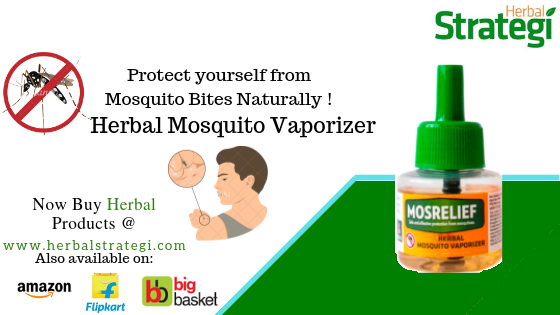The impact of chemical vaporizers on human health has been a cause for concern for a while now. Currently, a variety of repellents are marketed in the form of coils, mats, lotions, & vaporizers (plug-in mosquito repellent indoors). These repellents use the Allethrin group of compounds or DEET (N, N-Diethyl-toluamide). The vaporizers release an insecticide called Allethrin. While it works on mosquitoes, it is also bothersome to people with allergies or asthma. In heavier concentrations, it can be harmful to children. So don't use a chemical mosquito vaporizer indoors. Research shows that prolonged action of the Pyrethroids commonly used in repellent vaporizers leads to hyper excitation of the neuron system. Prallethrin, the chemical ingredient of any insect repellent, acts on the central nervous system causing headaches, dizziness, and sometimes leading to asphyxiation. Prolonged exposure to these chemicals causes permanent brain and nervous system damage. The presence of deodorized kerosene (96.40%) as a solvent in vaporizers is dangerous when inhaled regularly. They cause nausea, an increase in blood pressure, and bloodshot eyes. BHT (Butylated hydroxytoluene) used commonly in all insect repellents can lead to long-term enzyme changes that make the human body susceptible to cancer.
Content Table:
- 9 Health Hazards of Mosquito Vaporizers
- Respiratory problems
- Skin irritation
- Eye irritation
- Headaches
- Nausea and dizziness
- Allergies
- Neurological problems
- Environmental pollution
- Harmful to pets
- Safe Natural Alternatives
- Natural Mosquito Vaporizer liquid Repellent - Indoor Plug-in
9 Health Hazards of Mosquito Vaporizers
Respiratory problems
Mosquito vaporizers produce poisonous gases that can aggravate respiratory conditions such as asthma and bronchitis.
Skin irritation
The chemicals in mosquito vaporizers can cause skin irritation and rashes.
Eye irritation
Mosquito vaporizers liquid can also cause irritation and redness in the eyes.
Headaches
Mosquito liquid vaporizer vapours can induce headaches, especially when used in enclosed places.
Nausea and dizziness
When used in sufficient numbers, the chemicals in mosquito vaporizers can cause nausea and dizziness.
Allergies
Some people are allergic to the chemicals contained in mosquito vaporizers, which can result in severe responses.
Neurological problems
Long-term exposure to the chemicals included in mosquito vaporizers can result in neurological issues such as memory loss and confusion.
Environmental pollution
Mosquito vaporizers contribute to pollution by allowing chemicals to enter the air and water.
Harmful to pets
Mosquito vaporizers can be dangerous to pets, particularly cats, which are sensitive to toxins.
Safe Natural Alternatives
Natural Mosquito Vaporizer liquid Repellent - Indoor Plug-in
MosRelief is a 100 % Herbal Mosquito Vaporizer liquid, the first of its kind made from a blend of aromatic oils and plant extracts. It repels mosquitoes for over 8-12 hours. Herbal MosRelief is the best alternative to chemical vaporizers. MosRelief is made from lemongrass oil, margosa oil, and eucalyptus oil extracts. It is safe, non-toxic, and eco-friendly. It is safe to use with children around. MosRelief's container is designed to fit all existing mosquito vaporizer machines currently on the market. Mosquitoes can be very dangerous insects even though their size is small and care must be taken in keeping them away from your place of living as they spread disease with their bite. Herbal Mosquito Vaporizer is the better product when compared to its chemical counterpart in terms of what it does and the composition of the
Mosquito nets
Mosquito nets are a safe and effective method of keeping mosquitos at bay. These can be put over beds and windows to keep mosquitos out of the room.
Citronella Oil & candles
Citronella oil candles are a natural mosquito repellent that may be used both inside and outside. They give off a fragrance that mosquitoes despise.
Essential oils
Lavender, eucalyptus, and peppermint essential oils can be utilized as natural insect repellents. Spray a few drops of essential oil with water on the skin or around the room.
Garlic
Garlic is a natural mosquito repellant that can be taken in capsule form or added to food.
Lemon and eucalyptus oil
Natural insect repellents such as lemon and eucalyptus oil have been shown to be as effective as DEET, a chemical mosquito repellent.
Neem oil
Neem oil is a natural mosquito repellent that can be applied topically or diffused.
Tea tree oil
Tea tree oil is a natural mosquito repellent that can be applied directly to the skin or diffused.
Camphor
Camphor is a natural mosquito repellent that can be used to keep insects away from a room.
Basil Oil
Basil oil is a natural mosquito repellent that may be grown in the yard or eaten.
Catnip
Catnip, a natural mosquito repellent that can be grown in a garden or added to a diffuser, can be grown in a garden or added to diffuser.
In conclusion, mosquito vaporizers can be harmful to our health, hence it is critical to identify safe natural alternatives to repel mosquitos. We may protect ourselves and the environment from the damaging effects of mosquito vaporizers by using mosquito nets, citronella candles, essential oils, garlic, lemon, eucalyptus oil, neem oil, tea tree oil, camphor, basil, and catnip.

